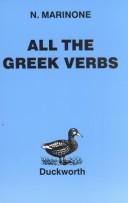| Listing 1 - 10 of 74 | << page >> |
Sort by
|

ISBN: 1472502256 9781472502254 9781472502261 1472502264 0715617729 1472502264 9780715617724 Year: 2016 Publisher: London, England ; New York, New York : Bloomsbury Academic,
Abstract | Keywords | Export | Availability | Bookmark
 Loading...
Loading...Choose an application
- Reference Manager
- EndNote
- RefWorks (Direct export to RefWorks)
All the Greek Verbs has established itself as an indispensable guide for all learners of Greek. In a clear and simple format, the book sets out over 13, 000 verb forms, which are listed alphabetically, and referred to the verbs from which they derive. Poetic and dialect forms are differentiated and grammatical tables set out standard endings and inflexions, making it easy for the student of Greek to navigate their way through the language.
Book
ISBN: 3111368394 3111011356 Year: 2016 Publisher: De Gruyter
Abstract | Keywords | Export | Availability | Bookmark
 Loading...
Loading...Choose an application
- Reference Manager
- EndNote
- RefWorks (Direct export to RefWorks)
Book
ISBN: 1463206569 9781463206567 1463237332 Year: 2016 Publisher: Piscataway, NJ: Gorgias Press,
Abstract | Keywords | Export | Availability | Bookmark
 Loading...
Loading...Choose an application
- Reference Manager
- EndNote
- RefWorks (Direct export to RefWorks)
Ancient language study is becoming an increasingly sophisticated and complex discipline, as scholars not only consider methods being used by specialists of other languages, but also absorb developments in other disciplines to facilitate their own research investigations. This interdisciplinary approach is reflected in the scope of research papers offered here, invited and peer-reviewed by the ISLP.
Book
ISBN: 1316626091 9781316626092 Year: 2016 Publisher: Cambridge: Cambridge university press,
Abstract | Keywords | Export | Availability | Bookmark
 Loading...
Loading...Choose an application
- Reference Manager
- EndNote
- RefWorks (Direct export to RefWorks)
Book
Year: 2016 Publisher: Nordhausen, [Germany] : Verlag Traugott Bautz GmbH,
Abstract | Keywords | Export | Availability | Bookmark
 Loading...
Loading...Choose an application
- Reference Manager
- EndNote
- RefWorks (Direct export to RefWorks)
Book

ISBN: 1463237332 Year: 2016 Publisher: Piscataway, NJ : Gorgias Press,
Abstract | Keywords | Export | Availability | Bookmark
 Loading...
Loading...Choose an application
- Reference Manager
- EndNote
- RefWorks (Direct export to RefWorks)
Ancient language study is becoming an increasingly sophisticated and complex discipline, as scholars not only consider methods being used by specialists of other languages, but also absorb developments in other disciplines to facilitate their own research investigations. This interdisciplinary approach is reflected in the scope of research papers offered here, invited and peer-reviewed by the ISLP.
Book
ISBN: 9780198747093 0198747098 Year: 2016 Publisher: Oxford: Oxford university press,
Abstract | Keywords | Export | Availability | Bookmark
 Loading...
Loading...Choose an application
- Reference Manager
- EndNote
- RefWorks (Direct export to RefWorks)
Classical Greek language --- Grammar --- Greek language --- Periphrasis --- Periphrasis. --- Grammar. --- Greek language - Grammar
Book
ISBN: 1443889326 9781443889322 9781443886918 Year: 2016 Publisher: Newcastle upon Tyne, England : Cambridge Scholars Publishing,
Abstract | Keywords | Export | Availability | Bookmark
 Loading...
Loading...Choose an application
- Reference Manager
- EndNote
- RefWorks (Direct export to RefWorks)
Greek language, Modern --- Romaic language --- Word formation.
Book
ISBN: 9789042933163 904293316X Year: 2016 Publisher: Leuven: Peeters,
Abstract | Keywords | Export | Availability | Bookmark
 Loading...
Loading...Choose an application
- Reference Manager
- EndNote
- RefWorks (Direct export to RefWorks)
This is the first ever comprehensive analysis of the morphosyntax and syntax of Septuagint Greek. The work is based on the most up-to-date editions of the Septuagint. The so-called Antiochene version of Samuel, Kings, and Chronicles as well as Judges has been studied. Though this is a synchronic grammar, and though not systematic, comparison with Classical Greek, the Greek of contemporary literature of the Hellenistic-Roman period, papyri and epigraphical data, and New Testament Greek has often been undertaken. Even when analysing translated documents of the Septuagint, the perspective is basically that of its readers. However, attempts were made to determine in what ways and to what extent the structure of the Semitic source languages may have influenced the selection of this or that particular construction by translators. At many places it is demonstrated and illustrated how an analysis of the morphosyntax and syntax can illuminate our general interpretation of the Septuagint text
Greek language, Biblical --- Syntax. --- Greek language [Biblical ] --- Syntax --- Bible. O.T. Greek --- Versions --- Septuagint
Book
ISBN: 9780521184250 9780521761420 0521184258 0521761425 Year: 2016 Publisher: Cambridge: Cambridge university press,
Abstract | Keywords | Export | Availability | Bookmark
 Loading...
Loading...Choose an application
- Reference Manager
- EndNote
- RefWorks (Direct export to RefWorks)
"Why learn to write in a dead language? Because a really good understanding of a language can only be attained by using it actively. Unlike earlier textbooks aimed at schoolboys, this work addresses modern adults who want to understand concepts fully as they learn. Drawing on recent scholarship where appropriate and assuming no prior background except some reading knowledge of Greek, the course combines a structured review of paradigms and vocabulary with clear and comprehensive explanations of the rules of Greek syntax. Large numbers of exercises are provided, both with and without key: a complete set of cumulative exercises and another set of non-cumulative exercises for those who prefer to dip into specific sections. The exercises include, as well as English sentences and paragraphs for translation, Greek sentences and passages for translation, analysis, and manipulation. A full English-Greek vocabulary and list of principal parts are included"--
Greek language --- Composition and exercises --- Composition and exercises. --- English --- Greek language - Composition and exercises
| Listing 1 - 10 of 74 | << page >> |
Sort by
|

 Search
Search Feedback
Feedback About UniCat
About UniCat  Help
Help News
News